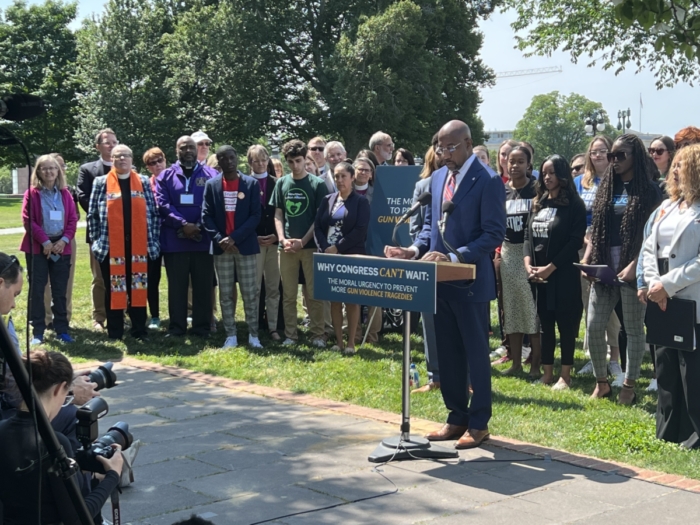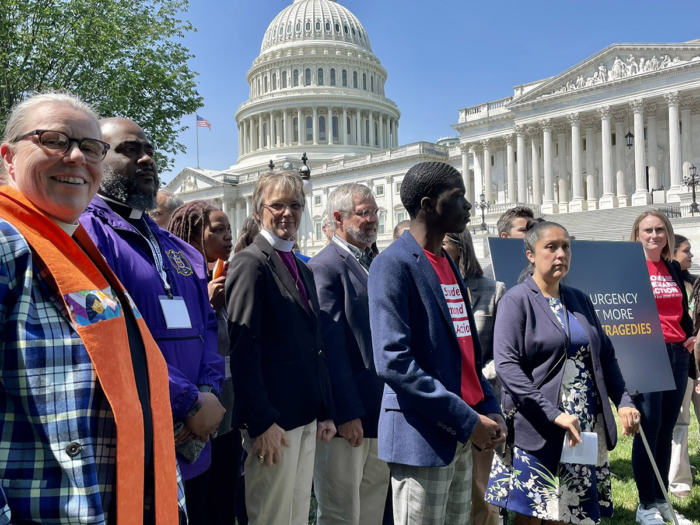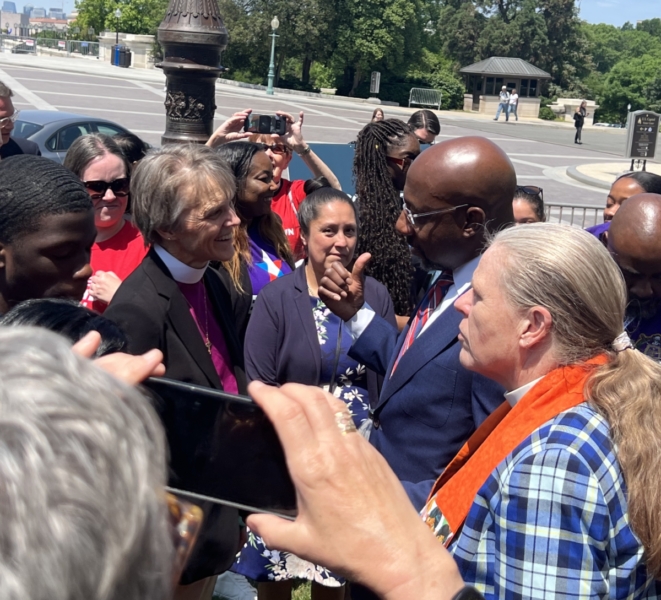Bishops United Against Gun Violence gathers in DC to learn ways to curtail gun violence by dismantling systemic racismPosted May 19, 2023 |
|

Episcopal bishops representing Bishops United Against Gun Violence and gun safety advocates joined Georgia Sen. Raphael Warnock on Capitol Hill May 18 during a press conference where the senator demanded that lawmakers put federal gun-safety bills on the ballot. Photo: Courtesy of Bishops United Against Gun Violence
[Episcopal News Service –Washington, D.C.] Bishops at the front lines of The Episcopal Church’s advocacy for gun control in the United States convened this week in Washington, D.C., to learn from and build relationships with local advocates working to curtail gun violence and racism during a two-day gathering.
The May 17-18 gathering was hosted by Bishops United Against Gun Violence, a network of more than 100 Episcopal Church bishops working to diminish gun violence. Several bishops and gun control advocates assembled at St. Mark’s Episcopal Church on Capitol Hill to listen to experts on community-based and data-driven methods to eradicate gun violence. The experts consisted of heads of various gun control advocacy nonprofit organizations, faith leaders and a public health scholar.
Ten bishops met with legislators on Capitol Hill to discuss gun violence on May 16 and May 17.
“I have seen cities where folks who are Black and brown are [much] more likely to be killed by a gunshot than people who happen to be white. So, there’s an intersection of racism and gun violence,” Michigan Bishop Bonnie Perry told Episcopal News Service. “For me, how we combat [racism and gun violence] as people of faith and as a bishop, that is how we can put gospel values into the world. This is how we make a difference in our world. It’s how our communities of faith show how much we care.”
Perry, a co-convener of Bishops United Against Gun Violence, previously served various roles within the Diocese of Newark and the Diocese of Chicago before being elected to the Diocese of Michigan in 2019. Chicago, Illinois, and Newark, New Jersey, are known for having some of the highest murder rates in the United States. Two mass shootings have occurred in Michigan since Perry’s election, one in February at Michigan State University in East Lansing and another in 2021 at Oxford High School in Oxford Township, north of Detroit.
Perry and Vicki Schroeder, a social justice advocate and parishioner at All Saints’ Episcopal Church in Saugatuck, Michigan, were both instrumental in launching End Gun Violence Michigan, a grassroots group credited with helping two anti-gun violence legislation packages pass in Michigan with another awaiting Michigan Gov. Gretchen Whitmer’s signature.

The Rt. Rev. Mariann Budde faces the camera during a May 18 press conference on Capitol Hill following the close of a two-day Bishops United Against Gun Violence gathering in Washington, D.C. Photo: Courtesy of Bishops United Against Gun Violence
According to the Gun Violence Archive, an American nonprofit that catalogs every incident of gun deaths in the United States, more than 200 mass shootings and more than 550 unintentional shootings have occurred so far in 2023. A mass shooting is any shooting in which four or more people are shot.
The May 17 gathering started with the Rev. Delonte Gholston, lead pastor at nondenominational Peace Fellowship Church in Deanwood, a predominantly Black neighborhood in Washington, D.C., sharing his work with Peace Walks DC, a loose interfaith coalition of gun violence survivors and advocates that seeks to decrease gun deaths. Roger Marmet, co-founder, and Marcus Ellis, executive director, of Peace for DC, a nonprofit dedicated to encouraging philanthropy to invest in violence intervention at a systemic level, discussed the need to build community-powered resources in Washington, D.C.’s most violent neighborhoods. The Rev. George Gilbert, senior pastor of Holy Trinity United Baptist Church in northeast Washington, D.C., also shared his gun control advocacy efforts and how he closely works with government officials and area neighborhood groups.
Daniel Webster, professor of American health at the Johns Hopkins Bloomberg School of Public Health in Baltimore, Maryland, presented public health approaches to gun violence prevention using research and data collected by the Johns Hopkins Center for Gun Violence and Solutions. A couple of less common approaches to reducing gun violence that Webster mentioned in his presentation included beautifying neighborhoods and removing lead hazards to reduce and prevent lead poising, which has been proven to cause aggression and impulsive behavior.
After the speakers finished their presentations, they sat down for a panel discussion, which led to a wider discussion of reparations and the need to dismantle poverty and systemic racism to curtail gun violence. Gholston, who is Black, told ENS that talking about race issues with the mostly white crowd of bishops while knowing The Episcopal Church’s role in slavery is a necessary step to achieve social progress so that people who aren’t stuck in cycles of violence have agency to help end them.
“If we’re going to see change, it’s going to take everybody, particularly the institutions that have historically been a major cause of harm to Black, brown and Indigenous communities in this country,” he said. “But for real healing to happen, those organizations, institutions and churches must be educated around what role they’ve played in creating that harm. So, I believe that the church can be a vessel full of healing in the world, and for that to happen, we must tell the truth about our past and we must do the work of repairing the harm that’s been caused.”
The May 17 gathering concluded with keynote speaker Ryane Nickens, founder and president of the Washington, D.C.-based nonprofit TraRon Center, sharing her story of trauma from gun violence as a child, and how therapy and mental health support are especially crucial for traumatized children. While a student at the Howard University School of Divinity and an intern at the Washington Interfaith Network, Nickens started the TraRon Center, which provides art therapy and individual and group counseling for children and families directly impacted by gun violence. The center also offers community programming and adult programs. The TraRon Center is named after Nickens’ sister and brother, Tracy and Ronnie, who were both murdered by gun violence on separate occasions.
“Families, children, brothers, sisters, our siblings in Christ are dying, and there has not been a reasonable solution. We must do something as it’s our call not only as Christians, but as human beings,” the Rev. Daniel Gutiérrez, bishop of the Diocese of Pennsylvania, told ENS. “I don’t want to hear about another mother, father, sister, brother crying, because someone’s lost. And we cannot just simply pray and hope it will go away, even though prayers are essential. We must do something. And if we come together as a community, I think we will find that way.”

Episcopal bishops, including the Rt. Rev. Mariann Budde, spoke with Georgia Senator Warnock after a press conference on May 18. Photo: Courtesy of Bishops United Against Gun Violence
In March, the five Pennsylvania dioceses’ bishops rallied inside the Capitol in Harrisburg to push for gun reforms at the state level, reflecting The Episcopal Church’s long history of advocating for gun-safety measures in the United States. In 2022, General Convention approved resolution calls for “investment in evidence-based community violence intervention programs and strategies that address gun violence as a public health issue; improve physical environments; strengthen anti-violence social norms; engage and support youth; reduce substance abuse; mitigate financial stress; reduce the harmful effects of the justice process; and confront the proliferation of guns.” Gutiérrez, a co-convener of Bishops United Against Gun Violence, proposed the resolution.
“Racism and inequality are the pressing evils that are leaning against us, and we must step forth to stop the violence. It’s not comfortable; it’s not easy, but we must, because when one person suffers, we all suffer,” Gutiérrez said.
The gathering closed on May 18 with a workshop by members of the Diocese of Washington, in partnership with the Maryland chapter of Moms Demand Action. Perry and Schroeder also presented how End Gun Violence Michigan was able to recently help gun safety bills pass in Michigan. Later in the morning, the bishops joined Georgia Sen. Raphael Warnock on Capitol Hill while he gave a press conference demanding that lawmakers put federal gun-safety bills on the ballot.
Episcopalians can learn more about the church’s gun violence prevention advocacy from the Office of Government Relations’ website.
-Shireen Korkzan is a reporter and assistant editor for Episcopal News Service. She can be reached at skorkzan@episcopalchurch.org.

Social Menu